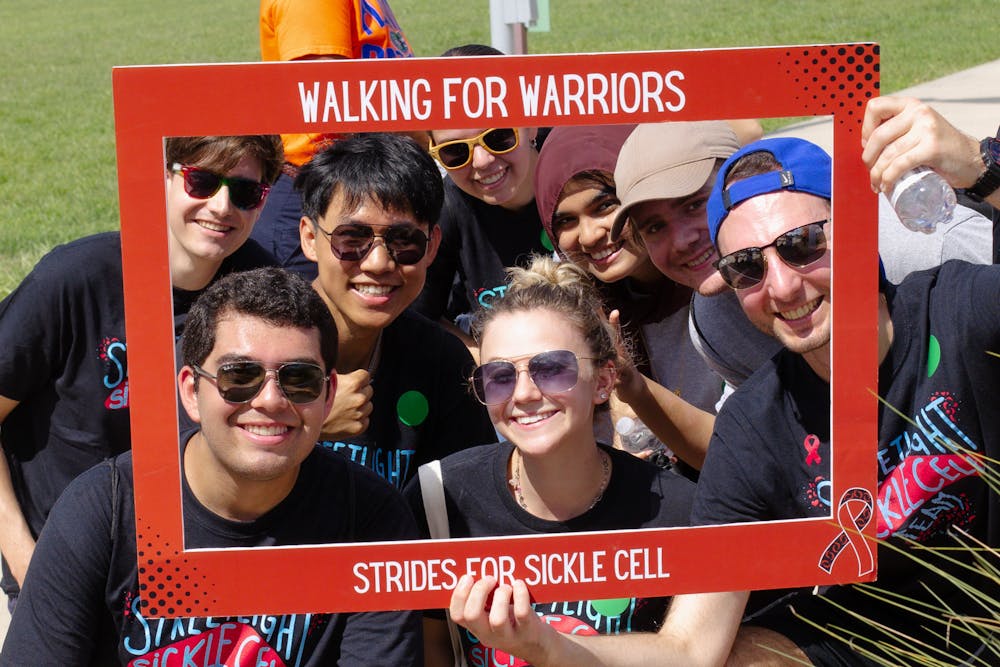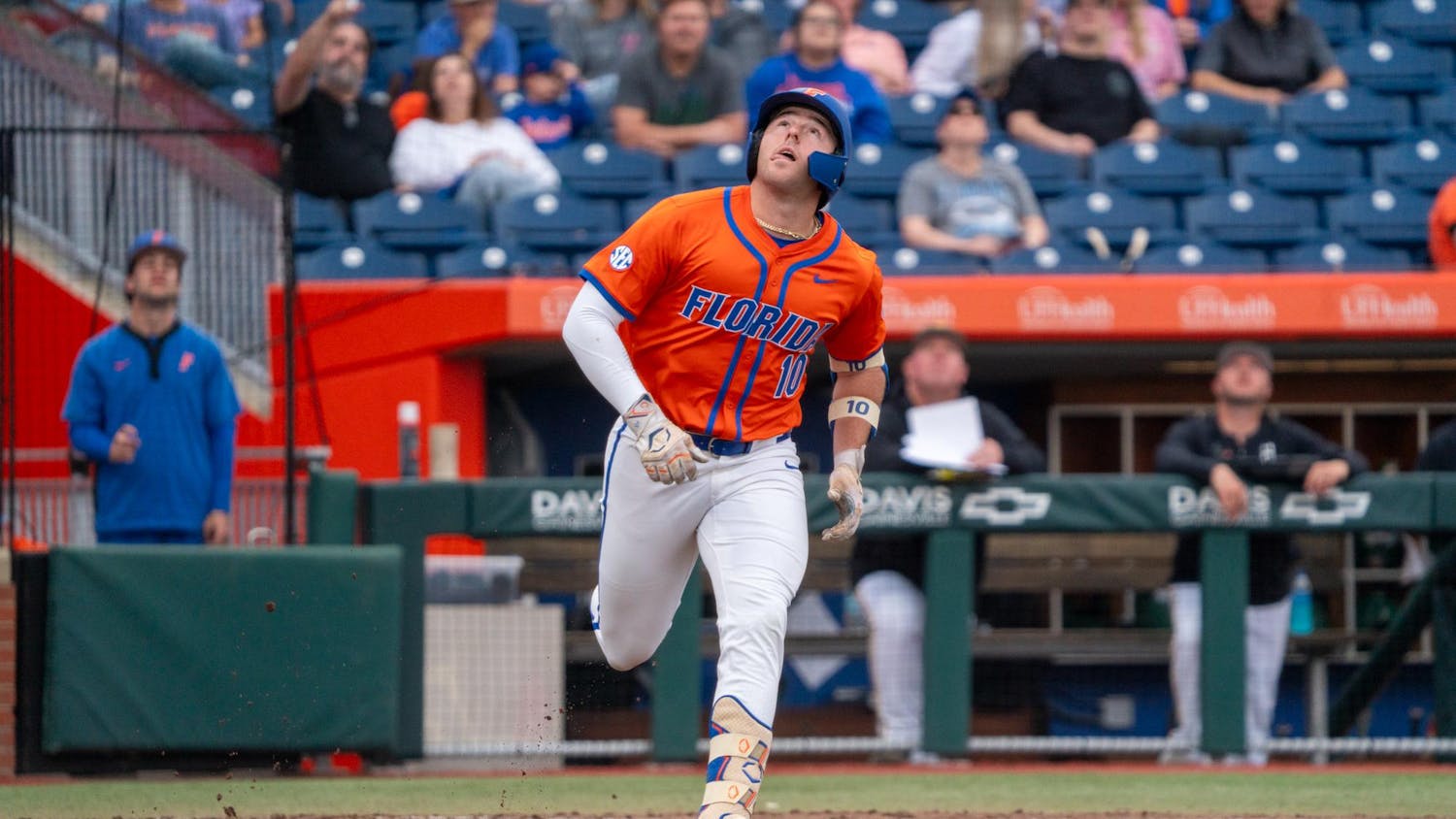What does it take to be a Warrior? Does it take super-human strength, excellence in physical combat or the ability and willingness to save the world? For some, all it takes is existing.
There are Warriors everywhere, but one wouldn’t be able to tell at first glance. They don’t wear capes. Instead, they wear red ribbons to symbolize what makes them a Warrior — sickle cell anemia.
The term Warriors refers to people experiencing excruciating bursts of pain due to sickle cell. There are over 20 million across the world, according to the Sickle Cell Warriors website, and many of them gathered at Depot Park Saturday to raise awareness for the disease.
Streetlight, a UF Health palliative care peer support program for patients aged 13 to 30 diagnosed with a chronic illness, hosted its second annual Strides for Sickle Cell Walk Sept. 21. With more than 300 people in attendance, the event raised over $4,000 to spread awareness for sickle cell disease.
The event invited the Gainesville area community to walk around the pond at Depot Park. Participants could walk as much or as little as they wanted to, and local vendors like UF Sickle Cell Research provided resources about the disease.
One of the Warriors in attendance was LaChelle Hope, who has been living with sickle cell disease for 33 years. Hope has sickle cell type SS, the most common and severe sickle cell disease, and 97% of the cells in her body are sickle cells.
To increase her hydration, the only thing Hope can drink is the ionized water Kangen Water from Okinawa, Japan, which she has to get specially distributed from Orlando.
For Hope, the term “Warrior” holds a special meaning.
“Have you ever tried to take an ice bath?” she asked. “You know that initial shock to your system where you feel all of this prickly kind of stabbing sensation? That’s kind of like a sickle cell crisis, except it can last for months. It can last for weeks.”
Hope said it’s this exact feeling that leads those with sickle cell to be deemed Warriors.
“To continue to go through that stabbing and push through every time and make it, it’s like you fought a fight,” she said. “You fought a battle, and you won.”
Though sickle cell disease is one of the most common genetic disorders, Emily Markey, the director of Streetlight, said not many people know about the disease. Markey said one of the walk’s goals is to increase awareness throughout the community.
“I think the biggest impact is really just bringing the community together,” Markey said. “A lot of people with sickle cell, I think, value people noticing their illness because you don’t see it on the outside.”
She said the goal of the event is to connect these people not only with each other but to those who recognize and support sickle cell anemia.
“This is really just an opportunity for them to know that we see you, and we hear you, and we respect everything that you live every day,” she said.
Although sickle cell disease cannot be physically identified, its power is strong enough to consume the human body.
Dr. Tung Wynn, a board-certified pediatric hematology-oncology physician at the UF, has specialized in sickle cell disease for over 20 years and described it as a disorder that causes red blood cells to not be produced in correct amounts.
Wynn said children with the disorder will experience anemia, causing their red blood cell counts to exist between six to nine. The standard blood count is 12.
“Because of the long-standing, persistent low red blood cell counts, patients have an increased demand for oxygen and an inability to meet that demand,” he said. “Their hearts take a toll on it. Heart function is poor. Liver function is poor. Kidney functions are poor. They aren’t able to live as full or as healthy of lives as people unaffected by sickle cell disease.”
Hope said she is very familiar with these symptoms. In addition to previously needing an oxygen mask, she experienced three mild strokes by the age of 12, pneumonia over 20 times and protein leaking from her kidneys.
Some people with sickle cell disease experience symptoms differently. In the past few years, Hope has watched many of her friends pass away from the disease.
Hope’s best friend, Michelle Munoz Jones, who she’s known since she was 8 years old, died from the disease.
In 2021, Jones was hospitalized due to complications from sickle cell. The year before, during the height of the pandemic, hospitals tightened their regulations. Hope said one of these regulations included prohibiting outside food.
Hope said Jones was very skinny and wasn’t able to hold down the hospital food, causing her to lose even more weight. After she was discharged, Jones still felt sick but was hesitant to return because she was afraid she would die. Jones passed soon after that, leaving behind her wife and two children.
Hope said medical practitioners were sending patients with the disease to “go home and deal with the crisis,” causing many to pass away.
“It was awful,” she said. “It was hell.”
When a Warrior passes away, Hope said there’s a special saying.
“They won the battle, but they lost the war,” she said. “They were a Warrior.”
Hope said many of her friends have passed away from the disease, and she used a Marvel analogy to convey their lifelong bravery.
“Imagine Marvel,” she said. “You know all the heroes? When Iron Man died, you lost your Warrior in combat. You were all encouraging each other to fight it, and you can do it. And just seeing your friends after you fought such a battle together… It’s just very hard.”
These stories helped motivate Wynn to initially reach out to Markey at Streetlight to raise community awareness, he said.
Wynn said the primary emotion that incentivized him to create Strides for Sickle Cell was frustration.
“As a physician, I can write prescriptions,” he said. “I can ask our staff within the hospital to help me with this and that, but so much of the need stems around ‘What can I do for the community? How can [I] help kids get through school?’”
He said although he can assist medically, he isn’t able to assist within the community.
“If community support isn’t there, those patients just aren’t receiving the best care possible. That’s what this grew out of — for us to really bring more community services for our patients,” Wynn said.
Wynn then partnered with Markey, and the two have been collaborating on community outreach for the past two years.
Markey said she first got involved with Streetlight in 2009 as a volunteer and became the director of the organization in 2014. She said Streetlight is a “companionship friendship program,” connecting those with chronic illness, including Warriors, with each other.
“We see people [aged] 13 to 30," she said. “It’s that time where you’re transitioning into adulthood and really forming your identity, and for a lot of our patients, they’re trying to figure out, ‘How do I incorporate my sickle cell identity into my greater identity?’”
Markey said she’s been working on Strides for Sickle Cell for the past six months, which primarily entailed seeking different organizations to participate in the event and raise money to support the overhead cost. Some of the vendors included the UF College of Pharmacy, UF Sickle Cell Research and UF Health Shands Arts in Medicine.
When she wasn’t getting hands-on with the walk, Markey was helping the Warriors in any way she could and working to promote community awareness.
“I think that just seeing how much pain that they have to live with on a daily basis, like when you see what people have to overcome just to survive, it really shows yourself what a perspective and privilege we all have and what we get to live every day,” she said.
Contact Tanya Fedak at tfedak@alligator.org. Follow her on Twitter @ttanyafedak.
Tanya Fedak is the Spring 2025 Avenue editor and third-year journalism major. You might also recognize her from WUFT, where she's an anchor and reporter. When she's not on the clock, you can find her rereading "Me Before You" or planning her next trip to NYC.






